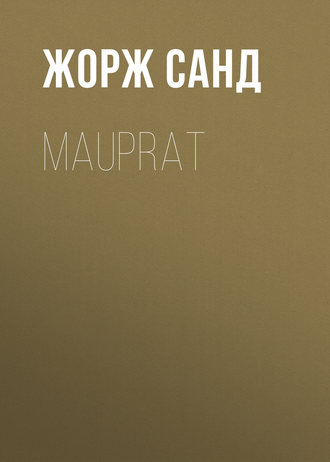 полная версия
полная версияMauprat
“You must be mad! Return at once; and if you are wise, you will remain away. It is the only thing left for you to do.”
“And since when,” I cried, flying into a passion, “have you had the right to drive me out of the bosom of my family?”
“Alas! you have no longer a family,” he answered, with an accent of sorrow that somewhat disarmed me. “What were once father and daughter are now naught but two phantoms, whose souls are already dead and whose bodies soon will be. Show some respect for the last days of those who loved you.”
“And how can I show my respect and grief by quitting them?” I replied, quite crushed.
“On this point,” said the abbe, “I neither wish nor ought to say anything; for you know that your presence here is an act of rashness and a profanation. Go away. When they are no more (and the day cannot be far distant), if you have any claims to this house, you may return, and you will certainly not find me here to contest them or affirm them. Meanwhile, as I have no knowledge of these claims, I believe I may take upon myself to see that some respect is paid to the last hours of these two holy people.”
“Wretched man!” I said, “I do not know what prevents me from tearing you to pieces! What abominable impulse urges you to be everlastingly turning the dagger in my breast? Are you afraid that I may survive this blow? Cannot you see that three coffins will be taken out together from this house? do you imagine that I have come here for aught but a farewell look and a farewell blessing?”
“You might say a farewell pardon,” replied the abbe, in a bitter tone, and with a gesture of merciless condemnation.
“What I say is that you are mad!” I cried, “and that if you were not a priest, this hand of mine should crush the life out of you for daring to speak to me in this way.”
“I have but little fear of you, sir,” he rejoined. “To take my life would be doing me a great service; but I am sorry that your threats and anger should lend weight to the charges under which you lie. If I saw that you were moved to penitence, I would weep with you; but your assurance fills me with loathing. Hitherto, I had seen in you nothing worse than a raging lunatic; to-day I seem to see a scoundrel. Begone, sir!”
I fell into an arm-chair, choking with rage and anguish. For a moment I hoped that I was about to die. Edmee was dying by my side, and before me was a judge so firmly convinced of my guilt that his usual gentle, timid nature had become harsh and pitiless. The imminent loss of her I loved was hurrying me into a longing for death. Yet the horrible charge hanging over me began to rouse my energies. I did not believe that such an accusation could stand for a single instant against the voice of truth. I imagined that one word from me, one look, would be sufficient to make it fall to the ground; but I felt so dazed, so deeply wounded, that this means of defence was denied me. The more grievously the disgrace of such a suspicion weighed upon my mind, the more clearly I realized that it is almost impossible for a man to defend himself successfully when his only weapon is the pride of slandered innocence.
I sat there overwhelmed, unable to utter a word. It seemed as if a dome of lead were weighing on my skull. Suddenly the door opened and Mademoiselle Leblanc approached me stiffly; in a tone full of hatred she informed me that some one outside wished to speak to me. I went out mechanically, and found Patience waiting with his arms folded, in his most dignified attitude, and with an expression on his face which would have compelled both respect and fear if I had been guilty.
“Monsieur de Mauprat,” he said, “I must request you to grant me a private interview. Will you kindly follow me to my cottage?”
“Yes, I will,” I replied. “I am ready to endure any humiliation, if only I can learn what is wanted of me and why you are all pleased to insult the most unfortunate of men. Lead the way, Patience, and go quickly; I am eager to return here.”
Patience walked in front of me with an impassive air. When we arrived at his little dwelling, we found my poor sergeant, who had just arrived likewise. Not finding any horse on which he could follow me, and not wishing to quit me, he had come on foot, and so quickly that he was bathed in perspiration. Nevertheless, the moment he saw us he sprang up full of life from the bench on which he had thrown himself under the bower of vine-branches, and came to meet us.
“Patience!” he cried, in a dramatic style which would have made me smile had it been possible for me to display a glimmer of mirth at such a moment. “Old fool!.. Slanderer at your age?.. Fie, sir!.. Ruined by good fortune.. you are.. yes.”
Patience, impassive as ever, shrugged his shoulders and said to his friend:
“Marcasse, you do not know what you are saying. Go and rest awhile at the bottom of the orchard. This matter does not concern you. I want to speak to your master alone. I wish you to go,” he added, taking him by the arm; and there was a touch of authority in his manner to which the sergeant, in spite of his ticklish prided, yielded from instinct and habit.
As soon as we were alone Patience proceeded to the point; he began by a series of questions to which I resolved to submit, so that I might the more quickly obtain some light on the state of affairs around me.
“Will you kindly inform me, monsieur,” he said, “what you purpose doing now?”
“I purpose remaining with my family,” I answered, “as long as I have a family; and when this family is no more, what I shall do concerns no one.”
“But, sir,” replied Patience, “if you were told that you could not remain under the same roof with them without causing the death of one or the other, would you persist in staying?”
“If I were convinced that this was so,” I rejoined, “I would not appear in their presence. I would remain at their door and await the last day of their life, or the first day of their renewed health, and again implore a love I have not yet ceased to deserve.”
“Ah, we have come to this!” said Patience, with a smile of contempt. “I should not have believed it. However, I am very glad; it makes matters clearer.”
“What do you mean?” I cried. “Speak, you wretch! Explain yourself!”
“You are the only wretch here,” he answered coldly, at the same time sitting down on the one stool in the cottage, while I remained standing before him.
I wanted to draw an explanation from him, at all costs. I restrained my feelings; I even humbled myself so far as to say that I should be ready to accept advice, if he would consent to tell me the words that Edmee had uttered immediately after the event, and those which she had repeated in her hours of delirium.
“That I will not,” replied Patience sternly; “you are not worthy to hear any words from that mouth, and I shall certainly never repeat them to you. Why do you want to know them? Do you hope to hide anything from men hereafter? God saw you; for Him there are no secrets. Leave this place; stay at Roche-Mauprat; keep quiet there; and when your uncle is dead and your affairs are settled, leave this part of the country. If you take my advice, you will leave it this very day. I do not want to put the law on your track, unless your actions force me. But others besides myself, if they are not certain of the truth, have at least a suspicion of it. Before two days have passed a chance word said in public, the indiscretion of some servant, may awaken the attention of justice, and from that point to the scaffold, when a man is guilty, is but a single step. I used not to hate you; I even had a liking for you; take this advice, then, which you say you are ready to follow. Go away at once, or remain in hiding and ready for flight. I do not desire your ruin; Edmee would not desire it either – so – do you understand?”
“You must be insane to think that I could listen to such advice. I, hide myself! or flee like a murderer! You can’t dream of that! Come on! come on! I defy the whole of you! I know not what fury and hatred are fretting you and uniting you all against me; I know not why you want to keep me from seeing my uncle and cousin; but I despise your follies. My place is here; I shall not quit it except by order of my cousin or uncle; and this order, too, I must take from their own lips; I cannot allow sentence to be brought me by any outsider. So, thanks for your wisdom, Monsieur Patience; in this case my own will suffice. I am your humble servant, sir.”
I was preparing to leave the cottage when he rushed in front of me, and for a moment I saw that he was ready to use force to detain me. In spite of his advanced age, in spite of my height and strength, he might still have been a match, perhaps more than a match, for me in a struggle of this kind. Short, bent, broad-shouldered, he was a Hercules.
He stopped, however, just as he was about to lay hands on me, and, seized with one of those fits of deep tenderness to which he was subject in his moments of greatest passion, he gazed at me with eyes of pity, and said, in a gentle tone:
“My poor boy! you whom I loved as a son (for I looked upon you as Edmee’s brother), do not hasten to your ruin. I beseech you in the name of her whom you have murdered, and whom you still love – I can see it – but whom you may never behold again. Believe me, but yesterday your family was a proud vessel, whose helm was in your hands; to-day it is a drifting wreck, without either sail or pilot – left to be handled by cabinboys, as friend Marcasse says. Well, my poor mariner, do not persist in drowning yourself; I am throwing you a rope; take it – a day more, and it may be too late. Remember that if the law gets hold of you, the man who is trying to save you to-day, to-morrow will be obliged to appear against you and condemn you. Do not compel me to do a thing the very thought of which brings tears to my eyes. Bernard, you have been loved, my lad; even to-day you may live on the past.”
I burst into tears, and the sergeant, who returned at this moment, began to weep also; he implored me to go back to Roche-Mauprat; but I soon recovered and, thrusting them both away, said:
“I know that both of you are excellent men, and both most generous; you must have some love for me too, since, though you believe me blackened with a hideous crime, you can still think of saving my life. But have no fears on my account, good friends; I am innocent of this crime, and my one wish is that the matter may be fully investigated, so that I may be acquitted – yes, this is inevitable, I owe it to my family to live until my honour has been freed from stain. Then, if I am condemned to see my cousin die, as I have no one in the world to love but her, I will blow my brains out. Why, then, should I be downcast? I set little store by my life. May God make the last hours of her whom I shall certainly not survive painless and peaceful – that is all I ask of Him.”
Patience shook his head with a gloomy, dissatisfied expression. He was so convinced of my crime that all my denials only served to alienate his pity. Marcasse still loved me, though he thought I was guilty. I had no one in the world to answer for my innocence, except myself.
“If you persist on returning to the chateau,” exclaimed Patience, “you must swear before you leave that you will not enter your cousin’s room, or your uncle’s, without the abbe’s permission.”
“What I swear is that I am innocent,” I replied, “and that I will allow no man to saddle me with a crime. Back, both of you! Let me pass! Patience, if you consider it your duty to denounce me, go and do so. All that I ask is that I may not be condemned without a hearing; I prefer the bar of justice to that of mere opinion.”
I rushed out of the cottage and returned to the chateau. However, not wishing to make a scandal before the servants, and knowing quite well that they could not hide Edmee’s real condition from me, I went and shut myself up in the room I usually occupied.
But in the evening, just as I was leaving it to get news of the two patients, Mademoiselle Leblanc again told me that some one wished to speak with me outside. I noticed that her face betrayed a sense of joy as well as fear. I concluded that they had come to arrest me, and I suspected (rightly, as it transpired) that Mademoiselle Leblanc had denounced me. I went to the window, and saw some of the mounted police in the courtyard.
“Good,” I said; “let my destiny take its course.”
But, before quitting, perhaps forever, this house in which I was leaving my soul, I wished to see Edmee again for the last time. I walked straight to her room. Mademoiselle Leblanc tried to throw herself in front of the door; I pushed her aside so roughly that she fell, and, I believe, hurt herself slightly. She immediately filled the house with her cries; and later, in the trial, made a great pother about what she was pleased to call an attempt to murder her. I at once entered Edmee’s room; there I found the abbe and the doctor. I listened in silence to what the latter was saying. I learnt that the wounds in themselves were not mortal, that they would not even be very serious, had not a violent disturbance in the brain complicated the evil and made him fear tetanus. This frightful word fell upon me like a death sentence. In America I had seen many men die of this terrible malady, the result of wounds received in the war. I approached the bed. The abbe was so alarmed that he did not think of preventing me. I took Edmee’s hand, cold and lifeless, as ever. I kissed it a last time, and, without saying a single word to the others, went and gave myself up to the police.
XXIV
I was immediately thrown into prison at La Chatre. The public prosecutor for the district of Issoudun took in hand this case of the attempted murder of Mademoiselle de Mauprat, and obtained permission to have a monitory published on the morrow. He went to the village of Sainte-Severe, and then to the farms in the neighbourhood of the Curat woods, where the event had happened, and took the depositions of more than thirty witnesses. Then, eight days after I had been arrested, the writ of arrest was issued. If my mind had been less distracted, or if some one had interested himself in me, this breach of the law and many others that occurred during the trial might have been adduced as powerful arguments in my favour. They would at least have shown that the proceedings were inspired by some secret hatred. In the whole course of the affair an invisible hand directed everything with pitiless haste and severity.
The first examination had produced but a single indictment against me; this came from Mademoiselle Leblanc. The men who had taken part in the hunt declared that they knew nothing, and had no reason to regard the occurrence as a deliberate attempt at murder. Mademoiselle Leblanc, however, who had an old grudge against me for certain jokes I had ventured to make at her expense, and who, moreover, had been suborned, as I learned afterward, declared that Edmee, on recovering from her first swoon, at a time when she was quite calm and in full possession of her reason, had confided to her, under a pledge of secrecy, that she had been insulted, threatened, dragged from her horse, and finally shot by me. This wicked old maid, putting together the various revelations that Edmee had made in her delirium, had, cleverly enough, composed a connected narrative, and added to it all the embellishments that hatred could suggest. Distorting the incoherent words and vague impressions of her mistress, she declared upon oath that Edmee had seen me point the barrel of my carbine at her, with the words, “As I swore, you shall die by my hand.”
Saint-Jean, who was examined the same day, declared that he knew nothing beyond what Mademoiselle Leblanc had told him that evening, and his deposition was very similar to hers. He was honest enough, but dull and narrow-minded. From love of exactness, he omitted no trifling detail which might be interpreted against me. He asserted that I had always been subject to pains in the head, during which I lost my senses; that several times previously, when my nerves were disordered, I had spoken of blood and murder to some individual whom I always fancied I could see; and, finally, that my temper was so violent that I was “capable of throwing the first thing that came to hand at any one’s head, though as a fact I had never, to his knowledge, committed any excess of this kind.” Such are the depositions that frequently decide life and death in criminal cases.
Patience could not be found on the day of this inquiry. The abbe declared that his ideas on the occurrence were so vague that he would undergo all the penalties inflicted on recalcitrant witnesses rather than express his opinion before fuller investigations had been made. He requested the public prosecutor to give him time, promising on his honour that he would not resist the demands of justice, and representing that at the end of a few days, by inquiring into certain things, he would probably arrive at a conviction of some sort; in this event he undertook to speak plainly, either for or against me. This delay was granted.
Marcasse simply said that if I had inflicted the wounds on Mademoiselle de Mauprat, about which he was beginning to feel very doubtful, I had at least inflicted them unintentionally; on this he was prepared to stake his honour and his life.
Such was the result of the first inquiry. It was resumed at various times during the following days, and several false witnesses swore that they had seen me shoot Mademoiselle de Mauprat, after vainly endeavouring to make her yield to my wishes.
One of the most baneful instruments of ancient criminal procedure was what was known as the monitory; this was a notice from the pulpit, given out by the bishop and repeated by all vicars to their parishioners, ordering them to make inquiries about the crime in question, and to reveal all the facts which might come to their knowledge. This was merely a modified form of the inquisitorial principle which reigned more openly in other countries. In the majority of cases, the monitory, which had, as a fact, been instituted in order to encourage informers in the name of religion, was a marvel of ridiculous atrocity; it frequently set forth the crime and all the imaginary circumstances the plaintiffs were eager to prove; it was, in short, the publication of a ready-made case, which gave the first knave that came a chance of earning some money by making a lying deposition in favour of the highest bidder. The inevitable effect of the monitory, when it was drawn up with a bias, was to arouse public hatred against the accused. The devout especially, receiving their opinions ready-made from the clergy, pursued the victim without mercy. This is what happened in my own case; but here the clergy of the province were playing a further secret part which almost decided my fate.
The case was taken to the assizes at the court of Bourges, and proceedings began in a very few days.
You can imagine the gloomy despair with which I was filled. Edmee’s condition was growing more and more serious; her mind was completely unhinged. I felt no anxiety as to the result of the trial; I never imagined it was possible to convict me of a crime I had not committed; but what were honour and life to me, if Edmee were never to regain the power of recognising my innocence? I looked upon her as already dead, and as having cursed me dying! So I was inflexibly resolved to kill myself immediately after receiving my sentence, whatever it might be. Until then I felt that it was my duty to live, and to do what might be necessary for the triumph of truth; but I was plunged in such a state of stupor that I did not even think of ascertaining what was to be done. Had it not been for the cleverness and zeal of my counsel, and the sublime devotion of Marcasse, my listlessness would have left me to the most terrible fate.
Marcasse spent all his time in expeditions on my behalf. In the evening he would come and throw himself on a bundle of straw at the foot of my trunkle bed, and, after giving me news of Edmee and the chevalier, whom he went to see every day, he would tell me the results of his proceedings. I used to grasp his hand affectionately; but I was generally so absorbed by the news he had just given me of Edmee, that I never heard anything further.
This prison of La Chatre had formerly been the stronghold of the Elevains of Lombaud, the seigneurs of the province. Nothing was left of it but a formidable square tower at the top of a ravine where the Indre forms a narrow, winding valley, rich with the most beautiful vegetation. The weather was magnificent. My room, situated at the top of the tower, received the rays of the rising sun, which cast the long, thin shadows of a triple row of poplars as far as the eye could see. Never did landscape more smiling, fresh, and pastoral offer itself to the eyes of a prisoner. But how could I find pleasure in it? Words of death and contumely came to me in every breeze that blew through the wall-flowers growing in the crannies. Every rustic sound, every tune on the pipe that rose to my room, seemed to contain an insult or to proclaim profound contempt for my sorrow. There was nothing, even to the bleating of the flocks, which did not appear to me an expression of neglect or indifference.
For some time Marcasse had had one fixed idea, namely, that Edmee had been shot by John Mauprat. It was possible; but as there was no evidence to support the conjecture, I at once ordered him not to make known his suspicions. It was not for me to clear myself at the expense of others. Although John Mauprat was capable of anything, it was possible that he had never thought of committing this crime; and as I had not heard him spoken of for more than six weeks, it seemed to me that it would have been cowardly to accuse him. I clung to the belief that one of the men in the battue had fired at Edmee by mistake, and that a feeling of fear and shame prevented him from confessing his misadventure. Marcasse had the courage to go and see all those who had taken part in the hunt, and, with such eloquence as Heaven had granted him, implored them not to fear the penalty for unintentional murder, and not to allow an innocent man to be accused in their stead. All these efforts were fruitless; from none of the huntsmen did my poor friend obtain a reply which left him any nearer a solution of the mystery that surrounded us.
On being transferred to Bourges, I was thrown into the castle which had belonged to the old dukes of Berry; this was henceforth to be my prison. It was a great grief to me to be separated from my faithful sergeant. He would have been allowed to follow me, but he had a presentiment that he would soon be arrested at the suggestion of my enemies (for he persisted in believing that I was the victim of a plot), and thus be unable to serve me any more. He wished, therefore, to lose no time, and to continue his investigations as long as they “should not have seized his person.”
Two days after my removal to Bourges, Marcasse produced a document which had been drawn up at his instance by two notaries of La Chatre. It contained the depositions of ten witnesses to the effect that for some days before the attempted assassination, a mendicant friar had been prowling about Varenne; that he had appeared in different places very close together; and, notably, that he had slept at Notre-Dame de Poligny the night before the event. Marcasse maintained that this monk was John Mauprat. Two women declared that they had thought they recognised him either as John or Walter Mauprat, who closely resembled him. But Walter had been found drowned the day after the capture of the keep; and the whole town of La Chatre, on the day when Edmee was shot, had seen the Trappist engaged with the Carmelite prior from morning till night in conducting the procession and services for the pilgrimage of Vaudevant. These depositions, therefore, so far from being favourable to me, produced a very bad effect, and threw odium on my defence. The Trappist conclusively proved his alibi, and the prior of the Carmelites helped him to spread a report that I was a worthless villain. This was a time of triumph for John Mauprat; he proclaimed aloud that he had come to deliver himself up to his natural judges to suffer punishment for his crimes in the past; but no one could think of prosecuting such a holy man. The fanaticism that he inspired in our eminently devout province was such that no magistrate would have dared to brave public opinion by proceeding against him. In his own depositions, Marcasse gave an account of the mysterious and inexplicable appearance of the Trappist at Roche-Mauprat, the steps he had taken to obtain an interview with M. Hubert and his daughter, his insolence in entering and terrifying them in their drawing-room, and the efforts the Carmelite prior had made to obtain considerable sums of money from me on behalf of this individual. All these depositions were treated as fairy tales, for Marcasse admitted that he had not seen the Trappist in any of the places mentioned, and neither the chevalier nor his daughter was able to give evidence. It is true that my answers to the various questions put to me confirmed Marcasse’s statements; but as I declared in all sincerity that for some two months the Trappist had given me no cause for uneasiness or displeasure, and as I refused to attribute the murder to him, it seemed for some days as if he would be forever reinstated in public opinion. My lack of animosity against him did not, however, diminish that which my judges showed against me. They made use of the arbitrary powers which magistrates had in bygone days, especially in remote parts of the provinces, and they paralyzed all my lawyer’s efforts by a fierce haste. Several legal personages, whose names I will not menton, indulged, even publicly, in a strain of invective against me which ought to have excluded them from any court dealing with questions of human dignity and morality. They intrigued to induce me to confess, and almost went so far as to promise me a favourable verdict if I at least acknowledged that I had wounded Mademoiselle de Mauprat accidently. The scorn with which I met these overtures alienated them altogether. A stranger to all intrigue, at a time when justice and truth could not triumph except by intrigue, I was a victim of two redoubtable enemies, the Church and the Law; the former I had offended in the person of the Carmelite prior; and the latter hated me because, of the suitors whom Edmee had repulsed, the most spiteful was a man closely related to the chief magistrate.









